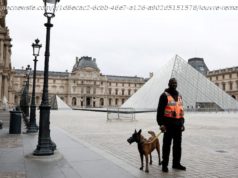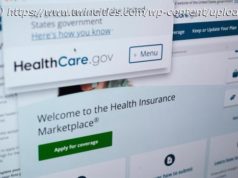James Comey will testify on Thursday about his interactions with President Donald Trump. His prepared testimony was posted on Wednesday.
June 8,2017
Chairman Burr, Ranking Member Warner, Members of the Committee.
Thank you for inviting me to appear before you today. I was asked to testify today to describe for you my interactions with President-Elect and President Trump on subjects that I understand are of interest to you. I have not included every detail from my conversations with the President, but, to the best of my recollection, I have tried to include information that may be relevant to the Committee.
January 6 Briefing
I first met then-President-Elect Trump on Friday, January 6 in a conference room at Trump Tower in New York. I was there with other Intelligence Community (IC) leaders to brief him and his new national security team on the findings of an IC assessment concerning Russian efforts to interfere in the election. At the conclusion of that briefing, I remained alone with the President Elect to brief him on some personally sensitive aspects of the information assembled during the assessment.
The IC leadership thought it important, for a variety of reasons, to alert the incoming President to the existence of this material, even though it was salacious and unverified. Among those reasons were: (1) we knew the media was about to publicly report the material and we believed the IC should not keep knowledge of the material and its imminent release from the President-Elect; and (2) to the extent there was some effort to compromise an incoming President, we could blunt any such effort with a defensive briefing.
The Director of National Intelligence asked that I personally do this portion of the briefing because I was staying in my position and because the material implicated the FBI’s counter-intelligence responsibilities. We also agreed I would do it alone to minimize potential embarrassment to the President-Elect. Although we agreed it made sense for me to do the briefing, the FBI’s leadership and I were concerned that the briefing might create a situation where a new President came into office uncertain about whether the FBI was conducting a counter-intelligence investigation of his personal conduct.
It is important to understand that FBI counter-intelligence investigations are different than the more-commonly known criminal investigative work. The Bureau’s goal in a counter-intelligence investigation is to understand the technical and human methods that hostile foreign powers are using to influence the United States or to steal our secrets. The FBI uses that understanding to disrupt those efforts. Sometimes disruption takes the form of alerting a person who is targeted for recruitment or influence by the foreign power. Sometimes it involves hardening a computer system that is being attacked. Sometimes it involves «turning» the recruited person into a double-agent, or publicly calling out the behavior with sanctions or expulsions of embassy-based intelligence officers. On occasion, criminal prosecution is used to disrupt intelligence activities.
Because the nature of the hostile foreign nation is well known, counterintelligence investigations tend to be centered on individuals the FBI suspects to be witting or unwitting agents of that foreign power. When the FBI develops reason to believe an American has been targeted for recruitment by a foreign power or is covertly acting as an agent of the foreign power, the FBI will «open an investigation» on that American and use legal authorities to try to learn more about the nature of any relationship with the foreign power so it can be disrupted.
In that context, prior to the January 6 meeting, I discussed with the FBI’s leadership team whether I should be prepared to assure President-Elect Trump that we were not investigating him personally. That was true; we did not have an open counter-intelligence case on him. We agreed I should do so if circumstances warranted. During our one-on-one meeting at Trump Tower, based on President Elect Trump’s reaction to the briefing and without him directly asking the Intelligence chiefs won’t say if Trump asked them to downplay Russia probe question, I offered that assurance.
I felt compelled to document my first conversation with the President-Elect in a memo. To ensure accuracy, I began to type it on a laptop in an FBI vehicle outside Trump Tower the moment I walked out of the meeting. Creating written records immediately after one-on-one conversations with Mr. Trump was my practice from that point forward. This had not been my practice in the past. I spoke alone with President Obama twice in person (and never on the phone) — once in 2015 to discuss law enforcement policy issues and a second time, briefly, for him to say goodbye in late 2016. In neither of those circumstances did I memorialize the discussions. I can recall nine one-on-one conversations with President Trump in four months — three in person and six on the phone.
January 27 Dinner
The President and I had dinner on Friday, January 27 at 6: 30 pm in the Green Room at the White House. He had called me at lunchtime that day and invited me to dinner that night, saying he was going to invite my whole family, but decided to have just me this time, with the whole family coming the next time. It was unclear from the conversation who else would be at the dinner, although I assumed there would be others.
It turned out to be just the two of us, seated at a small oval table in the center of the Green Room. Two Navy stewards waited on us, only entering the room to serve food and drinks.
The President began by asking me whether I wanted to stay on as FBI Director, which I found strange because he had already told me twice in earlier conversations that he hoped I would stay, and I had assured him that I intended to. He said that lots of people wanted my job and, given the abuse I had taken during the previous year, he would understand if I wanted to walk away.
My instincts told me that the one-on-one setting, and the pretense that this was our first discussion about my position, meant the dinner was, at least in part, an effort to have me ask for my job and create some sort of patronage relationship. That concerned me greatly, given the FBI’s traditionally independent status in the executive branch.
I replied that I loved my work and intended to stay and serve out my ten-year term as Director. And then, because the set-up made me uneasy, I added that I was not «reliable» in the way politicians use that word, but he could always count on me to tell him the truth. I added that I was not on anybody’s side politically and could not be counted on in the traditional political sense, a stance I said was in his best interest as the President.
A few moments later, the President said, «I need loyalty, I expect loyalty.» I didn’t move, speak, or change my facial expression in any way during the awkward silence that followed. We simply looked at each other in silence. The conversation then moved on, but he returned to the subject near the end of our dinner. At one point, I explained why it was so important that the FBI and the Department of Justice be independent of the White House. I said it was a paradox: Throughout history, some Presidents have decided that because «problems» come from Justice, they should try to hold the Department close. But blurring those boundaries ultimately makes the problems worse by undermining public trust in the institutions and their work.
Near the end of our dinner, the President returned to the subject of my job, saying he was very glad I wanted to stay, adding that he had heard great things about me from Jim Mattis, Jeff Sessions, and many others. He then said, «I need loyalty.» I replied, «You will always get honesty from me.» He paused and then said, «That’s what I want, honest loyalty.» I paused, and then said, «You will get that from me.» As I wrote in the memo I created immediately after the dinner, it is possible we understood the phrase «honest loyalty» differently, but I decided it wouldn’t be productive to push it further. The term — honest loyalty — had helped end a very awkward conversation and my explanations had made clear what he should expect.
During the dinner, the President returned to the salacious material I had briefed him about on January 6, and, as he had done previously, expressed his disgust for the allegations and strongly denied them. He said he was considering ordering me to investigate the alleged incident to prove it didn’t happen. I replied that he should give that careful thought because it might create a narrative that we were investigating him personally, which we weren’t, and because it was very difficult to prove a negative. He said he would think about it and asked me to think about it.
As was my practice for conversations with President Trump, I wrote a detailed memo about the dinner immediately afterwards and shared it with the senior leadership team of the FBI.
February 14 Oval Office Meeting
On February 14, I went to the Oval Office for a scheduled counterterrorism briefing of the President. He sat behind the desk and a group of us sat in a semi-circle of about six chairs facing him on the other side of the desk. The Vice President, Deputy Director of the CIA, Director of the National CounterTerrorism Center, Secretary of Homeland Security, the Attorney General, and I were in the semi-circle of chairs. I was directly facing the President, sitting between the Deputy CIA Director and the Director of NCTC. There were quite a few others in the room, sitting behind us on couches and chairs.
The President signaled the end of the briefing by thanking the group and telling them all that he wanted to speak to me alone. I stayed in my chair. As the participants started to leave the Oval Office, the Attorney General lingered by my chair, but the President thanked him and said he wanted to speak only with me. The last person to leave was Jared Kushner, who also stood by my chair and exchanged pleasantries with me.






